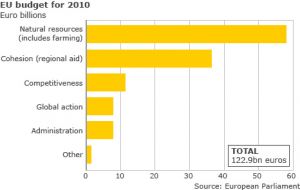MercoPress. South Atlantic News Agency
European Parliament approves 2010 budget: almost half for agriculture
 Farm subsidies persist as one of the main controversial points
Farm subsidies persist as one of the main controversial points The European Parliament has approved a 122.9bn Euro EU budget for 2010 - nearly half of which is to go to agriculture and natural resources. It is a 6% increase on the 2009 budget, which was worth 116bn Euros.
Next year the EU is due to conduct a major review of the budget. The UK wants to see a cut in farm subsidies.
In 2010 an extra 2.4bn Euro will go towards economic recovery projects, with the energy sector and broadband development the priorities.
It is part of an overall 5bn Euro in extra economic recovery funding for 2009-2010.
In addition, 300m Euro is going to help dairy farmers and 75m Euro is for decommissioning Bulgaria's Kozloduy nuclear plant.
The UK's net contribution to the EU budget will rise by almost 60% to 7.2bn Euro next year, the UK Treasury has said, because of the costs of EU enlargement and a cut in the annual rebate to the UK.
The 2010 allocation for agriculture and natural resources is 58bn Euro, compared to 52.5bn Euro in 2009. Regional aid - known as “cohesion” funds - gets 36bn Euro (35bn Euro in 2009). The 2010 budget amounts to 1.04% of EU gross national income (GNI).
It is the last year that the EU budget has been negotiated under Nice Treaty rules.
Under the Lisbon Treaty, which went into effect on 1 December, the European Parliament will have greater powers to influence the budget. All areas will be subject to parliament's “co-decision” with the EU governments.
For the first time MEPs will have the power to challenge farm spending figures. France and a number of East European countries are expected to resist any major reallocation of farm support.
But the budget for the planned EU diplomatic service - called the European External Action Service (EEAS) - has not yet been fixed.
That will be the job of the new EU foreign policy supremo, the UK's Baroness Ashton, provided MEPs confirm her as High Representative for Foreign Affairs in January.
In consultation with MEPs she will have to set the first budget for the EEAS, with a staff of up to 5,000. That is likely to happen in March-April 2010.
Under the economic recovery plan, EU funds will be spent on electricity links between the Republic of Ireland and Wales, offshore wind energy projects in the North Sea and carbon capture and storage projects in the UK, the parliament says on its website.
The chief negotiator on the budget, Hungarian MEP Laszlo Surjan, told the parliament that “we are enhancing energy security, supporting the creation of jobs”.
He also said there was an urgent need for a proper review of the EU's long-term budget, saying “we haven't got enough room for manoeuvre - there are headings where there are no reserves”. (BBC).




Top Comments
Disclaimer & comment rules-

Read all commentsUgh, European cowards are fake free traders. Ban all those subsidies and let's have real competition.
Dec 18th, 2009 - 09:19 am 0Commenting for this story is now closed.
If you have a Facebook account, become a fan and comment on our Facebook Page!